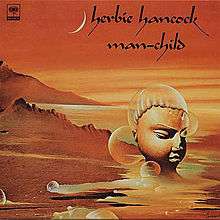Man-Child
| Man-Child | ||||
|---|---|---|---|---|
 | ||||
| Studio album by Herbie Hancock | ||||
| Released | August 22, 1975 | |||
| Recorded |
1974-75 Wally Heider Studios, San Francisco Village Recorders, Los Angeles Funky Features, San Francisco Crystal Studios, Los Angeles | |||
| Genre | Jazz-funk, jazz fusion | |||
| Length | 45:17 | |||
| Label | Columbia | |||
| Producer | David Rubinson, Herbie Hancock | |||
| Herbie Hancock chronology | ||||
| ||||
| Professional ratings | |
|---|---|
| Review scores | |
| Source | Rating |
| Allmusic | |
| The Rolling Stone Jazz Record Guide | |
Man-Child is the seventeenth studio album by jazz pianist Herbie Hancock. The record was released on August 22, 1975, via Columbia Records label.
Overview
It is arguably one of his most funk-influenced albums and it represents his further departure from the "spacey, higher atmosphere jazz," as he referred to it, of his earlier career. Hancock uses more funk based rhythms around the hi-hat, and snare drum. The tracks are characterized by short, repeated riffs by both the rhythm section, horns accompaniment, and bass lines. Man-Child features less improvisation from the whole band and more concentrated grooves with brief solos from the horns and Hancock himself on synthesizer and Fender Rhodes piano on top of the repeated riffs. This album features the addition of electric guitar to his new sound, which he started only five years prior to this album with Fat Albert Rotunda. The guitarists featured on this album were Melvin "Wah-Wah Watson" Ragin, DeWayne "Blackbyrd" McKnight and David T. Walker. Their extensive use of wah-wah pedal and accenting chords on the up-beat rather than the down-beat is what helps to give the album a distinct and funkier rhythm that is broken up by brief periods of stop-time where only the sustained chords are heard from the electric guitar with an open wah pedal. The riffs are fast-paced and energetic with repeating patterns that combine with multiple voices (i.e. horns, piano, bass, synthesizer, guitar, brief vocal patterns from Stevie Wonder and Herbie Hancock, and drums/percussion). The horns section in "Hang Up Your Hang-Ups" plays repeated riffs in unison that are alternating answered by electric piano, synthesizer, and electric guitar in brief periods of call and response.
Paul Jackson, Bill Summers, Harvey Mason, Bennie Maupin, and Mike Clark (who replaced Harvey Mason post-1974) formed the core of the group the Headhunters with which Hancock had toured and recorded for the previous three years. This was their final album as a group.
Track listing
- All compositions by Herbie Hancock except as indicated
| No. | Title | Length |
|---|---|---|
| 1. | "Hang Up Your Hang Ups" (Hancock, Ragin, Jackson) | 7:29 |
| 2. | "Sun Touch" | 5:11 |
| 3. | "The Traitor" (Hancock, Ragin, Johnson, Shorter) | 9:38 |
| 4. | "Bubbles" (Hancock, Ragin) | 9:02 |
| 5. | "Steppin' in It" | 8:41 |
| 6. | "Heartbeat" (Hancock, Ragin, Jackson) | 5:16 |
Personnel
- Herbie Hancock – synthesizer, acoustic piano, electric piano, ARP Odyssey, ARP Pro Soloist, Oberheim 4 Voice, Fender Rhodes, clavinet
- Wayne Shorter – alto and soprano saxophones
- Jay DaVersa, Bud Brisbois – trumpet
- Bennie Maupin – bass clarinet, alto flute, saxello, bass flute, tenor saxophone, soprano saxophone, percussion
- Dick "Slide" Hyde – tuba and bass trombone
- Garnett Brown – trombone
- Ernie Watts, Jim Horn – flute and saxophone
- Dewayne McKnight, David T. Walker – electric guitar
- Wah Wah Watson – synthesizer, voice bag, electric guitar
- Henry E. Davis, Paul Jackson, Louis Johnson – electric bass
- Harvey Mason, James Gadson, Mike Clark – drums
- Stevie Wonder – harmonica (#5)
- Bill Summers – percussion
Samples
Janet Jackson sampled "Hang Up Your Hang Ups" for her song All Nite (Don't Stop).
Die Fantastischen Vier sampled "Hang Up Your Hang Ups" for their song "Nenn Ihn Präsident" on their album 4 Gewinnt.
N.W.A sampled "Hang Up Your Hang Ups" for their song 100 Miles and Runnin'.
Noisia sampled "Hang Up Your Hang Ups" for their song Concussion.
External links
- Rolling Stone Biography //Broken Link
References
- ↑ Newsom, Jim (2011). "Man-Child - Herbie Hancock | AllMusic". allmusic.com. Retrieved 16 July 2011.
- ↑ Swenson, J. (Editor) (1985). The Rolling Stone Jazz Record Guide. USA: Random House/Rolling Stone. p. 94. ISBN 0-394-72643-X.